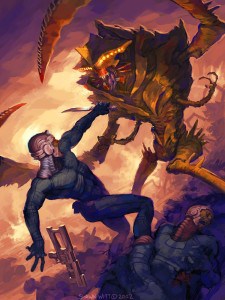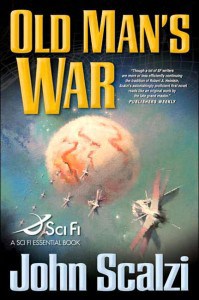With the release of his latest novel, Lock In, I decided to revisit my collection of beloved John Scalzi novels, beginning with the first Scalzi novel I ever read. Old Man’s War was published back in 2007, but that doesn’t mean it’s chopped liver compared to relatively new works like Ancillary Justice or Wool. Seven years on, this science fiction novel has become a classic of the science fiction genre and a staple of scifi, fantasy, and even non-related reading circles alike.

The premise of Old Man’s War is that man has made his way into interstellar space, where he often fights various alien races for control of habitable planets. The Colonial Defense Force (CDF) leads the charge in claiming territory – by force, if necessary. The CDF doesn’t recruit young, fresh men and women for its military arm, though. Only people old enough to retire and close enough to the grave are welcomed into the CDF. How do the elderly fight aliens? Why, with brand new bodies that are enhanced with cybernetic and bionic parts. For the elderly, it’s a new lease on life despite the requirement of service with the CDF.
You might still be asking yourself, why old people, though? A young, strong, quick body can be easily built, but experience is taught over time. Experience is a luxury, and the CDF cannot afford to wait for recruits to learn if they are to continue the propagation of the human race. Old folks have an entire lifetime of knowledge and skills, making them prime candidates. Strap a new body on those suckers and they’re better than any raw recruit on the battlefield.
Old Man’s War is one of those books that sneaks philosophical snippets into your action novel. A number of authors try to do this, but usually get it wrong. Thankfully, Scalzi is a master at storytelling. It goes a little something like this: You’re engrossed in heart-pounding action as the main character, John Perry, is battling the Consu. Who are the Consu? In short, they’re just one of many alien races in Old Man’s War bent on keeping hold of a little dust ball planet that humanity would rather claim for itself. Two or three paragraphs after the battle, you’re wondering about the efficacy of the colonial tendencies of humans past and present.
Scalzi also tackles a lot of social ideas in Old Man’s War. John Perry’s ethical stances on war, sexuality, ageism, anxiety, colonialism, extended lifespans, militarism, cybernetic and bionic enhancements, and death are all challenged as he continues through his military career. The reader is taken along on a tumultuous ride with Perry and is forced to examine their own social beliefs as Perry learns to cope with the things going on around him and the orders he is asked to carry out. It’s a learning experience, one that allows readers to glimpse a future that may be ahead of humanity as it colonizes other worlds and is forced to examine the norms of trying or unique situations.

Scalzi’s breakout novel is in the same vein as Joe Haldeman’s The Forever War and Hiroshi Sakurazawa’s All You Need Is Kill. All of these works of science fiction question the viability of humanity in a future full of vicious, never ending warfare against aliens, with dwindling resources and steadily-rising stakes as factors. If you haven’t read Old Man’s War yet, stop by your local library or book store and pick up a copy. It’s a relatively quick read, but I promise that you’ll fall in love with the Old Man’s War universe. More than that, you’ll fall in love with Scalzi’s clever storytelling and his characters’ hilariously quick wit. Seriously, you won’t be able to stop turning the pages.
You can find out more about John Scalzi’s novels and various projects at his website, Whatever.
Featured image courtesy The Art of Lucas Durham Blog
Last Updated on November 28, 2018.









